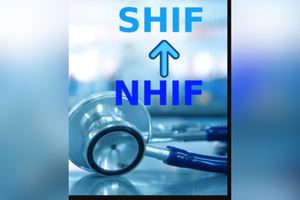
Many patients are struggling to access healthcare in hospitals across the country following the transition from NHIF to SHIF.
Ninety four per cent of private hospitals say patients are paying cash for healthcare, underscoring the burden Kenyans are facing as the country transitions from the National Health Insurance Fund (NHIF) to the Social Health Authority (SHA).
A survey by the Rural and Urban Private Hospitals Association, whose findings were made public on Tuesday, shows that 55 per cent of patients at premium hospitals paid out-of-pocket, raising concerns about the SHA’s primary objective of protecting Kenyans from excessive medical costs.
Out-of-pocket payments are partly attributed to lack of SHA registration among outpatients and their dependants (57 per cent).
Without SHA registration, these patients cannot access services.
“This high rate of out-of-pocket payment highlights a significant challenge in the country’s health insurance system, particularly for outpatient services and patients who are unregistered or not fully covered under the SHA framework,” the report says.
“Though SHA is making efforts to expand coverage, many patients still face direct costs, highlighting the need for more comprehensive insurance solutions.”
In addition, SHA’s limited outpatient reimbursement package poses challenges at Level Four and above hospitals, where patients are often required to get referrals from lower-level medical centres.
This leads to delays and additional steps, prompting patients to pay out-of-pocket to avoid complications.
The study adds that expanding outpatient coverage could reduce the financial burden on families.
Administrative delays in processing dependants in the SHA contributes to rising out-of-pocket expenditure. This affected 29 per cent of cases involving unlisted dependants requiring immediate care, particularly in the outpatient setting.
“Improving the efficiency of SHA in updating dependant records could reduce unnecessary costs. In addition, some patients remain sceptical about the reliability of the SHA due to misinformation, privacy concerns or discomfort with the Proxy Means Testing. This leads them to make cash payments rather than rely on SHA benefits,” the study says.
According to the report, patients incurred out-of-pocket costs due to referral requirements at higher levels of care.
Outpatient services at Level Four and above typically require referrals, leading to delays and increased administrative burden.
To overcome these barriers, many patients choose to pay out-of-pocket, highlighting the need to simplify referral processes, especially for essential outpatient services.
The report says limited coverage for high-cost services – such as ICU and HDU care and certain outpatient procedures – results in out-of-pocket costs for 18 per cent of patients.
“When actual costs exceed SHA reimbursement limits, patients are left to settle the difference. Expanding SHA coverage for high-cost treatment could reduce this financial burden,” the study adds.
Unavailability of covered medicines affected 14 per cent of SHA-insured patients, particularly those in financially constrained primary care hospitals. Essential drugs and services covered by SHA are not consistently available.









